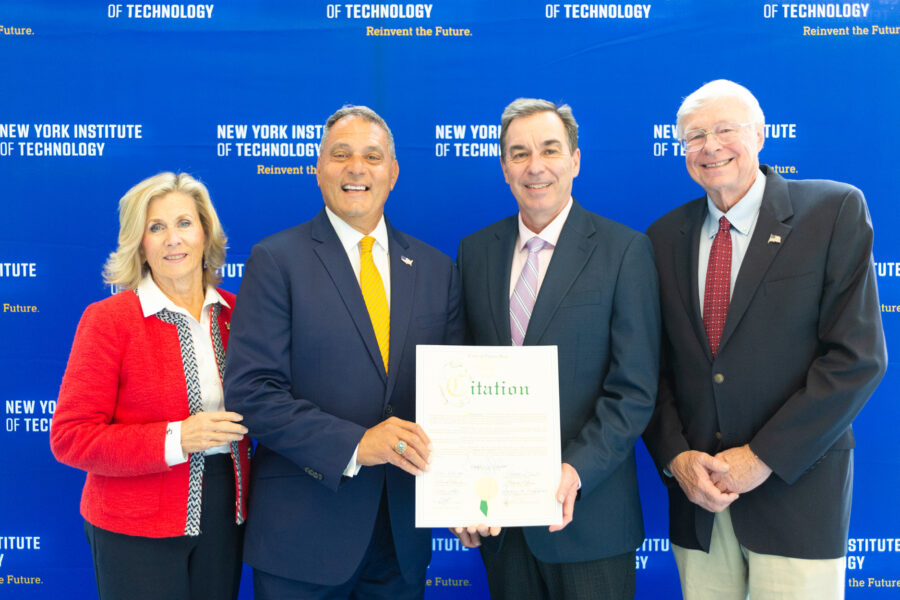
Bridging Business Knowledge With AI
New York Tech’s School of Management prepares students with both domain expertise and the ability to navigate new technologies, especially Artificial Intelligence (AI), that are reshaping every industry.
Previously, companies hired students with business degrees for their specialized knowledge, skills, and abilities in their chosen domain. But today, business skills alone will not suffice. With the rapid adoption of AI, the business world is experiencing a fundamental transformation where technology and business strategy are melding in ways previously unseen across industries, resulting in a massive talent gap.
Well-trained business professionals are needed who can bridge the gap between technology and business strategy. In an effort to fill this gap and continually add value to students and prepare them for successful career outcomes, the School of Management has embraced and integrated AI into its courses, focused on teaching students how to leverage technology to help achieve their goals in the classroom and beyond.
“New York Tech’s School of Management is where technology meets business,” says Dean Jaishankar Ganesh, Ph.D. “Our students learn how to use AI strategically and make data-driven decisions, so our graduates develop not only a strong foundation in business but also the skills employers demand in an increasingly tech-driven global marketplace.”
To learn more, New York Tech News surveyed several School of Management faculty to gain insight into how they are infusing AI technology into their courses and student projects.
Vidita Gawade, Ph.D., an assistant professor in the Department of Business and Quantitative Analytics, describes using AI in her courses as a supplementary tool, a “friend and peer” if you will, to help students apply technical hands-on skills in a timely way to then focus on higher-level analysis needed to solve real-world problems. “I would like to emphasize it’s where we problem-solve business problems—not only do we focus on applications of interest (whether it’s manufacturing, supply chain, finance, or healthcare), but we also look at making businesses run more efficiently. We use data, technology, and AI, combined with the knowledge that students bring in terms of strategy, leadership, and marketing insights,” Gawade says. “To align with industry, we enable new insights and build transferable skills by leveraging course material and AI.”
Faculty is intentional about weaving AI extensively into course content and learning processes. At the same time, students are encouraged to practice and learn new AI tools outside of the classroom and bring that learning back to apply in real-world contexts. This approach allows them to experience firsthand how technology plays a role in integrating theory with practice. “I also help students learn how to use AI not just as a productivity tool, but as a way to think critically and prepare for exams, for example, by prompting AI to quiz them, challenge their assumptions, or explain complex concepts in different ways,” says Professor of Marketing Colleen P. Kirk, D.P.S. Importantly, Kirk notes, that faculty emphasize that these technologies are not used in isolation. A central part of the School of Management’s approach is to bring real-world clients into the classroom, so that students apply AI-driven methods in live projects with tangible stakes. “By embedding these experiences into coursework, students are not just hearing about AI as a trend; they are practicing with it, reflecting on its role in decision-making, and gaining the confidence to apply it in real-world contexts,” she adds.
In courses taught by Chartered Financial Analyst and Assistant Professor of Accounting and Finance Wenyao Hu, Ph.D., AI is framed as a supportive partner in analysis: it accelerates information processing, but the ultimate evaluation and decision-making remain in the hands of students equipped with financial knowledge. “The future of workflow will be AI plus human, not AI versus human. In my courses, I emphasize that AI should be seen as a tool that helps us process information more efficiently, rather than replacing human judgment.”
Radoslaw Nowak, Ph.D., associate professor of management, embraces a similar strategy. “In my case, homework assignments and group projects are AI-infused, which encourage students to use this technology to gather relevant information and predict alternative scenarios, but ultimately to apply their own knowledge and judgment in developing solutions that can lead to better managerial decisions and reduce the risk of costly strategic errors.”
Using AI in Solution Strategies
Broadly speaking, having students help a small business solve an operations management problem is a relatively common term project in many top business schools; what is new in our approach is requiring students to use AI in their solution strategy and having them clearly articulate how AI was used to complement their work, according to Samer Charbaji, Ph.D., assistant professor of quantitative and business analytics. “Real-world problems are often more complex than the ‘simplified’ operations models we cover in class; as such, students are required to use AI tools to help them bridge the gap between the two and generate solutions that business owners can implement and benefit from,” he says. AI tools help them improve their data collection strategy, find the appropriate operations models for their business environment, and formulate the relevant assumptions to fit their data with their chosen model. “For example, the simple economic order quantity inventory model we cover in class may not be well-suited for a grocery store that sells perishable items. AI can help them explore variations of this core model that can apply more appropriately to such a setting,” he explains.
By teaching students how to leverage AI in business contexts, we help them stand out in today’s highly competitive job market, notes Bisrat Kinfemichael, Ph.D., associate professor of economics, who has incorporated AI into Managerial Economics for Decision Making. “This integration enhances students’ skills by equipping them with cutting-edge tools to examine and forecast economic variables. These AI tools make it easier for students to apply advanced estimation and forecasting techniques, developing their ability to analyze and interpret data for informed business decision-making,” he notes.
The school is also offering new AI-focused degree offerings, including undergraduate programs in Business AI and Analytics and Forensic Accounting and Financial Fraud Investigation, and a master’s degree in FinTech and Financial Data Analytics. “The demand for professionals who can bridge business knowledge with AI and analytics expertise continues to outpace supply,” notes Shaya Sheik, Ph.D., professor of supply chain and business analytics and associate dean for graduate programs. “By creating such innovative and timely undergraduate and graduate degree programs, New York Tech is addressing this talent shortage.”
The interviews have been edited and condensed.
More News

Intern Insight: Khushi Vasoya
Fashion and jewelry enthusiast Khushi Vasoya bridged that passion with her studies in business administration and finance while interning with LabGrown Box.

Intern Insight: Hardik Hardik
As a business technology intern, M.B.A. student Hardik Hardik worked closely with mass transit and security equipment manufacturer Boyce Technologies’ production and quality teams to support daily manufacturing operations.

Brands Must Balance AI and Authenticity
As consumer behavior expert Colleen Kirk, D.P.S., explains, in 2026, marketers leveraging AI must remember to prioritize genuine connections and transparency.

Startup Tech Central Officially Opens
Members of New York Tech and the local community gathered to celebrate the grand opening of Startup Tech Central, a resource for students to transform ideas into real-world impact.

Intern Insight: Mohammad Nazim Dawla
M.B.A. student Mohammad Nazim Dawla acquired skills at his accounting internship that he will carry with him throughout his career.

Edward Guiliano Global Fellows: Culture Across Continents
Under the Edward Guiliano Global Fellowship program, seven students traveled the globe, broadening their perspectives and working on transformational research projects.